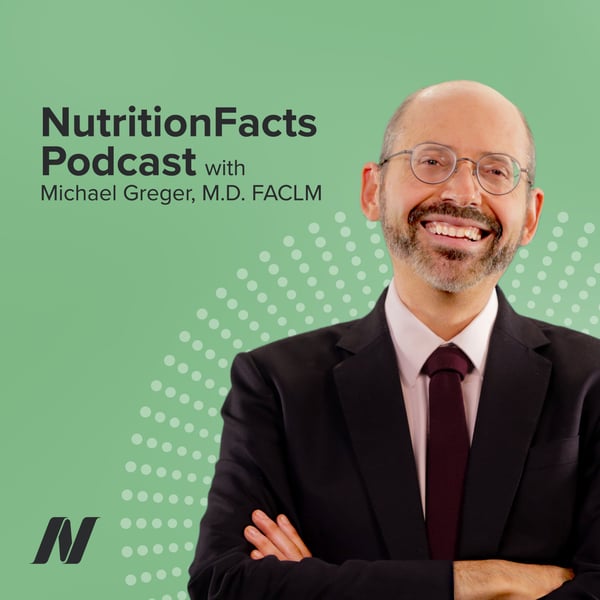Bariatric Surgery vs. Diet
Nutrition Facts with Dr. Greger
[email protected]
4.8 • 3.6K Ratings
🗓️ 17 March 2022
⏱️ 15 minutes
🧾️ Download transcript
Summary
This episode features audio from Bariatric Surgery vs. Diet to Reverse Diabetes and How Sustainable Is the Weight Loss After Bariatric Surgery?. Visit the video pages for all sources and doctor's notes related to this podcast.
Transcript
Click on a timestamp to play from that location
| 0:00.0 | Let's say you're trying to lose 20 pounds or boost your immunity or increase your ability to fight COVID or even cancer. |
| 0:08.0 | Well, the amazing thing is with the right diet, you are well in your way to achieving these vital health goals. |
| 0:15.0 | Welcome to the Nutrition Facts Podcast. I'm your host, Dr. Michael Greger. |
| 0:21.0 | Today we look at how losing weight without rearranging your gastrointestinal anatomy carries advantages beyond just the lack of surgical risk. |
| 0:31.0 | The surgical community objects to the characterization of bariatric surgery as merely internal jaw wiring and cutting into healthy organs just to discipline people's behavior. |
| 0:41.0 | They've gone as far as to rename it metabolic surgery, suggesting the anatomical rearrangements cause changes in digestive hormones that offer unique physiological benefits. |
| 0:52.0 | As evidence, they point to the remarkable remission rates for type 2 diabetes. |
| 0:57.0 | After bariatric surgery, about 50% of obese diabetics and 75% of super obese diabetics go into remission, meaning they have normal blood sugars on a regular diet off all diabetes medications. |
| 1:11.0 | The normalization of blood sugars can happen within literally days after the surgery, and then 15 years after the surgery, 30% may remain free from their diabetes compared to a 7% curate in a non-surgical control group. |
| 1:26.0 | Are we sure it was the surgery though? One of those challenging parts of bariatric surgery is lifting the liver. |
| 1:35.0 | Since obese individuals tend to have such large fatty liver, this can be tricky, risking liver injury and bleeding. |
| 1:42.0 | And large livers are one of the most common reasons less invasive laparoscopic surgery turns into fully invasive open surgery, leaving the patient with a large full belly scar and increased risk of wound infections, complications and recovery time. |
| 1:55.0 | But lose even just 5% of your body weight and your fatty liver may shrink by 10%. That's why those awaiting bariatric surgery are put on a diet. |
| 2:05.0 | Then after surgery, patients are typically placed on an extremely low calorie liquid diet for weeks. Could their improvement in blood sugars just be from the calorie restriction rather than some sort of surgical metabolic magic? |
| 2:19.0 | Researchers decided to put it to the test. |
| 2:23.0 | At a bariatric surgery clinic at the University of Texas, patients with type 2 diabetes scheduled for gastric bypass volunteered to first undergo an identical period of calorie restriction, but without the surgery. |
| 2:36.0 | They were placed in the hospital and put on the same diet they would be on immediately before and after the surgery for 10 days, averaging less than 500 calories a day to mimic the surgical situation. |
| 2:47.0 | Then the researchers weighed a few months so the patients would gain the weight back and then put them through the actual surgery matched day to day for the diets they were on before. |
| 2:56.0 | So same patients, same diets, just with or without the actual surgery. If there was some sort of metabolic benefit to the anatomical rearrangement, they would have done better after the actual surgery. |
| 3:08.0 | But in some ways they actually did worse. The calorie restriction alone resulted in similar improvements in blood sugar, pancreatic function and insulin sensitivity, but several measures of diabetic control improved significantly more without the surgery. |
| 3:22.0 | So the surgery seemed to put them at a metabolic disadvantage. |
| 3:26.0 | The calorie restriction works by first mobilizing fat out of the liver. Type 2 diabetes is thought to be caused by fat building up in the liver and then spilling over into the pancreas. Everyone may have a personal fat threshold for the safe storage of excess fat. |
... |
Please login to see the full transcript.
Disclaimer: The podcast and artwork embedded on this page are from [email protected], and are the property of its owner and not affiliated with or endorsed by Tapesearch.
Generated transcripts are the property of [email protected] and are distributed freely under the Fair Use doctrine. Transcripts generated by Tapesearch are not guaranteed to be accurate.
Copyright © Tapesearch 2025.

